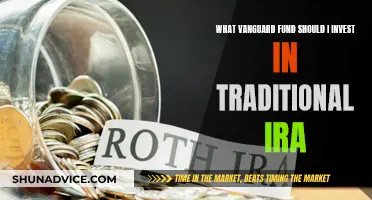
Money market mutual funds are a type of mutual fund that invests in cash, cash equivalents, and short-term debt securities. They are designed to offer investors high liquidity with a very low level of risk and are often used as a temporary place to store money before investing elsewhere. Money market funds are not the same as money market accounts, which are savings accounts offered by banks and credit unions that are FDIC-insured. Money market funds are considered extremely low-risk and are intended to maintain a net asset value (NAV) of $1 per share.
| Characteristics | Values |
|---|---|
| Type of Mutual Fund | Money market funds are a type of mutual fund |
| Investment | Cash, cash equivalents, and short-term debt securities |
| Volatility | Lowest-volatility types of investments |
| Income | Taxable or tax-exempt, depending on the types of securities |
| Risk | Very low level of risk |
| Liquidity | High liquidity |
| Investment Instruments | Bankers' Acceptances, Certificates of Deposit, Commercial Paper, Repurchase Agreements, U.S. Treasuries |
| Management | Professionally managed portfolio |
| Net Asset Value (NAV) | $1 per share |
| Returns | Better than bank accounts |
| Capital Appreciation | Low |
| Sensitivity | Sensitive to interest rate fluctuations |
What You'll Learn

Money market funds vs money market accounts
Money market funds and money market accounts (MMAs) are distinct financial products with different features, regulations, and risks. Here is a detailed comparison:
Money Market Funds:
Money market funds, also known as money market mutual funds, are a type of mutual fund that invests in highly liquid, short-term, low-risk debt instruments. These instruments include cash, cash equivalents, and high-credit-rating debt securities with short maturities, such as U.S. Treasuries. Money market funds aim to provide investors with high liquidity and very low risk. They are considered extremely low-risk investments and are suitable for investors who want to park their money temporarily before investing elsewhere.
Money market funds are not guaranteed or insured by the Federal Deposit Insurance Corporation (FDIC). Instead, they are regulated by the Securities and Exchange Commission (SEC) and insured by the Securities Investor Protection Corporation (SIPC) for up to $500,000, including $250,000 in cash. The income generated by these funds can be taxable or tax-exempt, depending on the types of securities in the fund's portfolio.
Money market funds are considered stable investments with a target value of $1 per share. They have only dipped below this value on rare occasions, typically associated with financial crises, and have quickly recovered. However, they are not suitable for long-term investment goals, such as retirement planning, as they offer little capital appreciation.
Money Market Accounts:
Money market accounts, also known as money market deposit accounts, are federally insured liquid bank accounts. They are offered by banks and credit unions and are insured by the FDIC (for banks) or the National Credit Union Administration (NCUA) (for credit unions) for up to $250,000. MMAs pay interest on deposits, with rates varying among financial institutions. Some top-yielding MMAs currently offer annual percentage yields (APYs) greater than 5%, while the average bank savings account pays around 0.61%.
MMAs function similarly to savings accounts and often provide tools similar to checking accounts, such as debit cards and check-writing abilities. They usually come with transaction limits, typically restricting account holders to six withdrawals per billing statement period. The interest earned in MMAs is subject to taxation.
MMAs are considered safe and accessible financial products, making them ideal for emergency funds and short-term savings goals. They offer higher interest rates than traditional savings accounts but generally require higher minimum balance requirements.
Key Differences:
The main differences between money market funds and money market accounts lie in their level of risk, liquidity, regulation, and intended investment duration:
- Money market funds are investment products with a low but present risk of loss, while MMAs are insured bank accounts with no risk of loss within the FDIC or NCUA coverage limits.
- Money market funds are regulated by the SEC and insured by the SIPC, while MMAs are insured by the FDIC or NCUA.
- Money market funds are intended for short-term investments, providing high liquidity and easy access to funds. In contrast, MMAs are suitable for longer-term savings goals and may have transaction limits that restrict frequent withdrawals.
- Money market funds typically offer lower returns than MMAs but can provide diversification benefits and are less sensitive to interest rate changes.
Short-Term Investment Strategies: Where to Park Your Money
You may want to see also

Low-risk, short-term investments
Money market funds are a type of mutual fund that invests in low-risk, short-term debt securities. They are designed to offer a safe, stable investment option for money that may be needed in the short term. Money market funds are typically used to hold money for upcoming purchases or emergency funds.
Money market funds are a conservative investment option, providing high liquidity and low risk. They are a type of fixed-income mutual fund that invests in highly liquid, short-term debt. Money market funds are considered extremely low-risk as they invest in low-risk instruments like government-backed securities.
Money market funds are a good option for those with short-term investment goals or those building their emergency savings. They are also suitable for those with a low tolerance for volatility or those looking to diversify their portfolio with a more conservative investment.
- Money market funds are mutual funds that invest in short-term debt securities with minimal credit risk.
- They are among the lowest-volatility types of investments and are intended to preserve principal while providing stable income.
- Money market funds are regulated by the U.S. Securities and Exchange Commission (SEC), which sets strict guidelines for the quality, maturity, liquidity, and diversification of the fund's investments.
- Money market funds are not insured by the Federal Deposit Insurance Corporation (FDIC) but may be eligible for coverage under the Securities Investor Protection Corporation (SIPC).
- Money market funds aim to maintain a stable $1 net asset value (NAV) per share, and any excess earnings are distributed to investors as dividends.
- The yield on money market funds varies, and it is important to consider the 7-day yield when comparing different funds.
- Money market funds are typically used for short-term goals, such as saving for a wedding, a down payment on a home, or unexpected expenses.
- They offer higher yields than traditional bank savings accounts and provide easy access to funds without the fees or penalties associated with other investments like certificates of deposit (CDs).
- Money market funds are a good option for those seeking a safe, liquid, and higher-yielding alternative to traditional bank accounts.
Investing in Qualified Opportunity Funds: A Comprehensive Guide
You may want to see also

Taxable and tax-exempt funds
Money market funds are divided into two categories: taxable and tax-free. If you’re buying a taxable fund, any returns from the fund will generally be subject to regular state and federal taxes. Taxable funds mainly invest in U.S. Treasury securities, government agency securities, repurchase agreements, certificates of deposit, commercial paper, and bankers’ acceptances.
Tax-free funds, on the other hand, do not provide as many options. These funds invest in short-term debt obligations issued by federally tax-exempt entities (municipal securities) and have a lower yield. In some cases, you can purchase tax-free funds that are exempt from both state and local taxes, although these kinds of exemptions are the exception rather than the norm.
While tax-exempt funds can be a smart way to reduce your income taxes, they are not for everyone. For example, if you are investing outside of an IRA or another retirement plan, you won't gain anything by including a tax-exempt fund in an already tax-advantaged account. Similarly, if you are not in one of the higher tax brackets, tax-exempt funds are probably not the right fit. You likely won't save enough in taxes to make up for the lower yields you typically get from a tax-exempt fund.
Transferring Funds: Stash Invest to Spend
You may want to see also

Government, prime and municipal funds
Money market funds are classified into various types depending on the class of invested assets, the maturity period, and other attributes. The U.S. Securities and Exchange Commission (SEC) defines three categories of money market funds based on the investments of the fund: government, prime, and municipal.
Government Funds
Government money funds invest a minimum of 99.5% of their total assets in cash, government securities, and repurchase agreements that are fully collateralized by cash or government securities. Treasury Funds are also included in Government Money Funds, which invest in standard U.S. Treasury-issued debt securities, such as Treasury bills, Treasury bonds, and Treasury notes. Government funds are considered the safest and most liquid type of money market fund.
Prime Funds
Prime money funds invest in floating-rate debt and commercial paper of non-Treasury assets. These may be issued by corporations, U.S. government agencies, and government-sponsored enterprises (GSEs). Prime funds are also known as general-purpose funds and can invest in any eligible U.S. dollar-denominated money market instruments as defined by the SEC.
Municipal Funds
Municipal money market funds, also known as tax-exempt funds, invest a minimum of 80% of their assets in municipal securities whose interest is exempt from federal income tax and, in some cases, state income taxes. Municipal funds are suitable for non-retirement accounts that are not already tax-shielded.
SEC rules further classify prime and municipal funds as either retail or institutional based on the investors in the fund. Retail funds are available to individual investors, while institutional funds are held by institutional investors. Retail funds may continue to maintain a stable $1.00 net asset value per share (NAV), while institutional funds price and transact at a floating NAV, which will experience fluctuations.
Invest in Mutual Funds: PAN Card Alternatives
You may want to see also

Advantages and disadvantages
Money market mutual funds are a type of mutual fund that invests in highly-rated, short-term debt securities. They generate income but little to no capital appreciation. Money market funds are considered low-risk, low-return investments.
Advantages
Money market funds are a good investment option for those seeking:
- Low Risk and Short Duration: Money market funds are often considered less risky than stocks and bonds. They invest in low-risk vehicles such as certificates of deposit (CDs), Treasury bills, and short-term commercial paper. The short durations of these securities limit a money market fund's sensitivity to interest rate risk.
- Stability and Security: Money market funds are among the least volatile types of investments available, making them a good option for offsetting the greater volatility of stock and bond investments. They also provide a secure, short-term investment option when no other is feasible.
- Potential Tax Efficiency: Money market funds may invest in securities whose interest payments are exempt from federal and, in some cases, state income taxes.
- Liquidity: Money market funds are highly liquid, and investors can generally access their assets daily.
- Diversification: Money market funds offer instant diversification across a range of securities.
- Better Returns than Bank Accounts: Money market funds typically provide better returns than standard interest-bearing bank accounts.
Disadvantages
However, there are also several drawbacks to consider:
- Low Returns: Money market funds often yield just 2-3% due to the fixed-income nature of their investments. This can result in a lost opportunity for better rates of return and hinder an individual's ability to build wealth over time.
- Loss of Purchasing Power: If the inflation rate is higher than the return generated by the money market fund, investors will lose purchasing power.
- Expenses: Small annual fees can eat up a substantial chunk of profits, especially when returns are already low.
- No Federal Insurance Protection: Money market funds are not insured by the Federal Deposit Insurance Corporation (FDIC). While they are covered by the Securities Investor Protection Corporation (SIPC), this only provides financial protection if the investments can be replaced.
- Risk of Higher Yields: Fund managers may take on additional risk to obtain higher yields, which may not always be the smartest move depending on investment objectives and time horizon.
Hedge Fund Managers: Where to Find Their Investment Theses
You may want to see also
Frequently asked questions
A money market mutual fund is a type of mutual fund that invests in cash, cash equivalents, and short-term debt securities. They are designed to offer a safe, stable investment option for money that may be needed in the short term.
Money market funds sell shares to investors who can then earn income from the fund's portfolio. They blend highly-rated, short-term securities with longer-dated securities (up to 397 days for most funds).
Money market funds offer liquidity, capital preservation, diversification, operational efficiency, and the potential for enhanced yield. They are also a good option for those with a low tolerance for volatility or those looking to diversify with a more conservative investment.







